|
International Perspectives - December 6, 1999
Anne D. Picker
International Economist, Econoday
The euro teeters and the yen hangs tough...
Financial Markets
The foreign equity markets finished the week with a flourish. Although it was too late for the Asian markets, the European markets soared in relief on the "benign" U.S. labor market report. However, for most of the week, the focus was on the currency markets as traders waited with calm resignation to see when the euro would fall to parity with the dollar. Traders were wary lest the Bank of Japan intervene in the currency markets again after Monday and Tuesday's futile attempts to curb the yen.
| Selected World Stock Market Indexes |
| Index | 19-Nov | 1999
High | 1999
Low | Week %
Change |
|---|
| Asia |
| Australia | All Ordinaries | 3086.80 | 3145.20 | 2804.80 | 0.88 |
| Japan | Nikkei 225 | 18368.14 | 18914.50 | 13232.70 | -2.89 |
| Hong Kong | Hang Seng | 15840.41 | 15840.41 | 9076.33 | 3.70 |
| S. Korea | Korea Composite | 966.59 | 1027.93 | 498.42 | 1.84 |
| Singapore | Straits Times | 2227.81 | 2235.82 | 1286.56 | -0.36 |
| Europe |
| Britain | FTSE 100 | 6742.20 | 6742.20 | 5770.20 | 0.86 |
| France | CAC |
5468.05 | 5468.05 | 3958.70 | 1.32 |
| Germany | XETRA DAX | 6119.17 | 6119.17 | 4668.50 | 2.70 |
| North America |
| United States | Dow | 11286.18 | 11286.18 | 9120.70 | 2.71 |
| Canada | TSE Composite 300 | 7794.70 | 7890.00 | 6180.30 | -1.21 |
| Mexico | Bolsa |
6470.10 | 6470.10 | 3300.42 | 2.09 |
Equities
Europe
European markets were mixed for most of the week. Investors had been worried that there would be another U.S. interest rate hike early next year, especially if the U.S. employment report was above expectations. Analysts also were concerned that signs of rising inflation in Euroland would lead to higher interest rates soon. These concerns, combined with the continuing weakness of the euro, battered market sentiment. Toward the end of the week, traders' concern about what the Bank of England's Monetary Policy Committee will do began to surface.
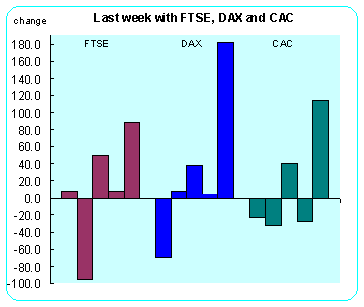
The French CAC index closed at yet another record high, up 71 points or 1.32 percent on the week. The equity markets in the Netherlands and Sweden also hit new highs. The German DAX soared 182 points on Friday to close up 161 points or 2.7 percent on the week. The British FTSE recovered from earlier ambivalence and set an intraday high, to close up 57 points or 0.86 percent on the week.
Asia
The Nikkei continues to be pressured by the yen. Even though the Bank of Japan intervened in the foreign exchange markets on Monday and Tuesday, the yen remained at high levels against both the dollar and the euro. The Nikkei finished the week sharply lower as nervous investors unloaded export oriented along with information and technology related issues amid the yen's renewed surge. A strong yen makes Japanese exports more expensive abroad and thus less competitive, cutting earnings of export-oriented Japanese companies. The Nikkei ended the week down 2.89 percent.
The Hong Kong Hang Seng index soared on Friday, leaping 237 points or 1.5 percent. Technology stocks, especially those with Chinese interests and a thriving property group led the way. On the week, the Hang Seng was up 3.7 percent.
Currencies
Yen
The Bank of Japan intervened in the currency markets on Monday and Tuesday and left currency markets on edge the rest of the week looking for more intervention. On Monday, the yen fell to about 104 yen to the dollar, but when the European Central Bank (ECB) and Federal Reserve did not participate in the intervention, the yen resumed its climb. The yen shrugged off a second day of intervention by the Japanese authorities to curb the currency's strength.
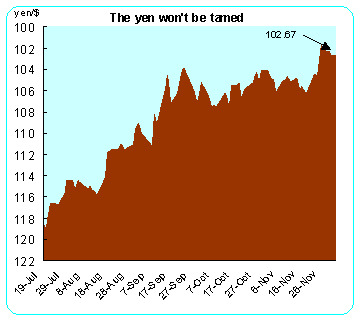
Investor demand for the yen needed to buy Japanese stocks is expected to continue to overwhelm the Bank of Japan's efforts unless the ECB and the Fed also intervene. The Bank of Japan has intervened in the currency markets twelve times this year in their effort to weaken the yen. Even so, the yen has risen more than 14 percent against the dollar in five months. Many traders are waiting for the third quarter gross domestic product report due on Monday, to gauge the yen's likely direction.
Euro
At this writing, the euro is teetering on parity with the dollar. The euro became worth less than a dollar for a brief moment late Thursday in a symbolic blow to the single currency that was meant to challenge the dollar's dominance. Although the euro rebounded somewhat, the slow drop to parity highlights its weakness since its inception. It has lost more than 16 percent since it traded over $1.18 on January 4th.
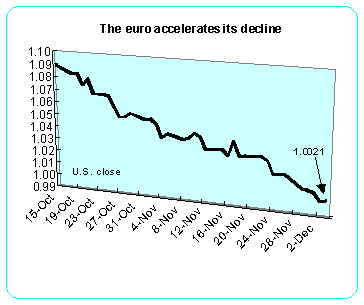
The reasons for the fall are many. Most recently, the eruption of tensions between the European Central Bank and German Chancellor Gerhard Schroeder (because of his latest economic policy moves) have been highlighted by market participants. Mr Schroeder has been accused of damaging Europe's image by meddling in the hostile bid by Vodafone AirTouch for Mannesmann and providing state aid to rescue the huge construction company, Philip Holzmann
The ECB has until now pursued a policy of benign neglect. It monitors the currency markets, talking up the euro, but refuses to intervene directly. However, it recently raised interest rates by 50 basis points to three percent, partly to ward off inflation - a move that briefly boosted the value of the currency.
Commodities
Gold
The Bank of England held the third of a series of gold reserves sales on Monday. The Bank auctioned 25 tons of gold reserves. The auction price of $293.50 a troy ounce was marginally higher than the market price before the announcement of the disposal plan in May. But it was $3 below the previous afternoon's London fix. AngloGold, the world's largest gold mining company bought almost 40 per cent of the stocks on offer. The next gold auctions are scheduled for January 25, 2000, and March 21, 2000. Spot gold fell $2.00 immediately after the announcement. Gold closed the week at $282.40, down $17.10.
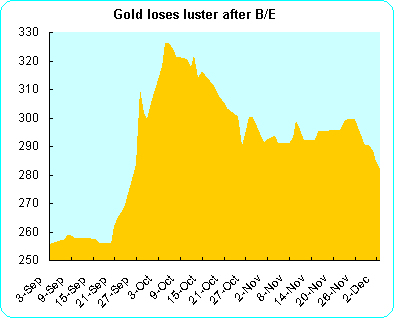
Oil
Crude oil prices fluctuated during the week amid conflicting information about whether Iraq would accept an extension to its oil for food plan with the United Nations. Suggestions that the Organization of Petroleum Exporting Countries (OPEC) might relax its output restrictions if U.S. prices remained above $25 a barrel also roiled the market. However, reassurances from Kuwait and Algeria that the OPEC cuts would extend beyond their original expiry deadline of March 2000 helped sentiment. In New York light crude ended the week at $25.70 a barrel. Increased oil prices have boosted the stock of the world's leading oil companies along with shareholder earnings. However, the higher oil prices are putting an upward pressure on price indexes in just about every country.
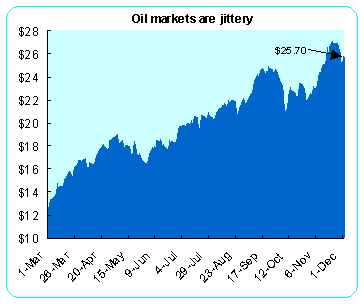
A postscript on the World Trade Organization...
The World Trade Organization (WTO) concluded its Seattle meeting late Friday, failing in its primary task - to set the agenda for the millenium trade negotiations. New meetings are scheduled for Geneva after the first of the year on a previously agreed agenda, but no new trade liberalization issues will be started and no deadline has been set for their conclusion. Although there was progress, negotiators were unable to reach consensus to launch a new round of trade talks because they ran out of time.
The negotiations were fraught with difficulties long before the delegates arrived and hit several potholes during the week of frantic negotiations. The negotiators worked through the week with virtually no sleep and in the end were unable to find a compromise on difficult issues, including agriculture, labor and the environment. However the biggest sticking point of all seemed to be the demands by developing countries to be given more time to comply with WTO deadlines on a variety of trade liberalizations.
Indicator Scoreboard
Purchasing Managers' Surveys
The first week of the month brings with it an onslaught of purchasing managers' surveys and sentiment surveys in Europe. This week was no exception. To sum up, the results were similar across Europe. The indexes remained steady. Euroland remained at 57, with Germany, France and Italy standing at 55.3, 59.4 and 57.1 respectively. A key to understanding these surveys is that a level above 50 indicates expansion, while a level below 50 indicates contraction. The overall and manufacturing indexes were above 50 and climbing. However, so were the price subindexes.
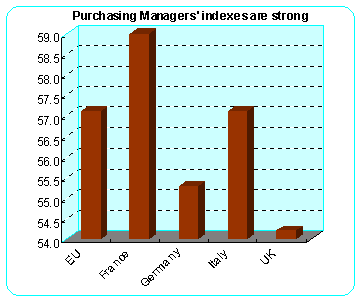
Britain
November manufacturing sector activity picked up again, but so did input price inflation, according to a seasonally adjusted index from the Chartered Institute of Purchasing and Supply. Average input prices accelerated for the third month in a row. Firms cited strong global demand for many raw materials and intermediate goods, which led to widespread shortages and enabled suppliers to raise their prices.
The November Halifax house price index dropped a seasonally adjusted 0.5 percent on the month, sharply reversing the previous month's strong rise. This should be seen more as a correction than the beginning of any downward trend. The annual rate declined, but is a very strong 10.7 percent. Last month's annual rate of house price inflation of 10.8 percent was the fastest since August 1989. The latest Halifax figures may offer some comfort to the Bank of England's Monetary Policy Committee which has clearly been worried about the strength of the housing market and has cited it as a factor behind decisions to raise interest rates.
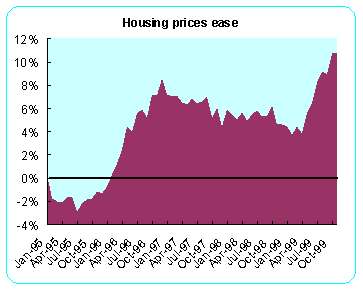
EMU
The September preliminary trade surplus with the rest of the world fell to 2.5 billion euros from a surplus of 4.1 billion euros a year earlier. September exports were up five percent from September 1998 level after a flat reading in August. Imports stood were up seven percent when compared with last year and a three percent increase in August. The global economic recovery and the recent weakness of the euro are expected to have continued positive effects on exports in the months ahead.
Germany
Third quarter German exports rose five percent on the year with strong gains particularly in Euroland, the United States and Japan. During the first nine month of 1999, total German exports rose to 0.8 percent over the same period a year earlier. Third quarter exports to the United States were particularly strong, up 16.2 percent. From January to September, exports to the United States were up 9.7.
France
October seasonally adjusted unemployment dropped to 11 percent on the month according to the ILO jobless rate definition, which excludes job seekers that did any work during the month. This far exceeded expectations.
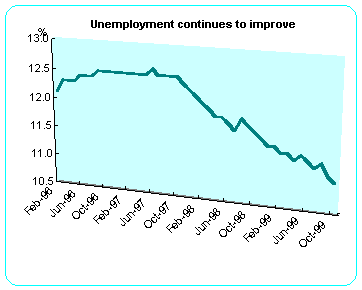
November consumer confidence rose to a new record high, surpassing even the most optimistic forecasts. The surveys suggest that households are more optimistic about future earnings and living standards and appear slightly more willing to buy big ticket items.
Italy
Preliminary producer prices in October rose 0.6 percent on the month and 1.6 percent on the year and were at the high end of expectations thanks to a surge in prices of intermediate goods.
Unadjusted industrial orders rose for the fourth consecutive month in September, up 5.5 percent when compared with last year. They were boosted by a 7.5 percent rise in foreign demand, the largest increase in demand from abroad since August 1998. However, the fall in orders of traditional Italian export goods such as clothing and shoes continues, and this could be linked to the fact that Italy can no longer devalue its currency.
Japan
October's unemployment rate remained at 4.6 percent, unchanged from September. The number of unemployed looking for jobs was 3.11 million, up from 2.90 million in October last year but down from 3.17 million in September. The number of employed people declined 260,000 from the year before.
Japanese industrial production fell a seasonally adjusted 2.3 percent on the month in October but was up 1.7 percent on the year on an unadjusted basis. It was the second month in a row that showed a 2.3 percent monthly decrease.
Korea
Korean industrial output exploded 30.6 percent in October over the previous year as domestic consumption rose along with exports of computers and semiconductors. Shipments soared 33.2 percent on the year while inventories declined 5.7 percent on the year.
Americas
Canada
Third quarter real gross domestic product climbed at a 4.7 percent annualized rate, following a revised increase of 3.1 percent in the second. Third quarter real GDP rose 1.2 percent, a fourth consecutive quarter of solid growth. Exports grew at a 3.6 percent rate during the third quarter after a flat second quarter. Consumer spending rose 1.2 percent in the third quarter led by durable goods purchases.
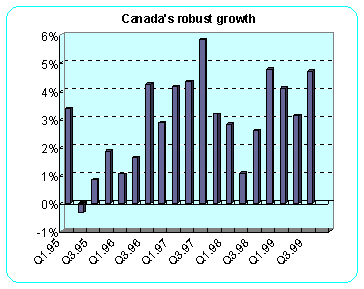
November employment increased strongly for the third consecutive month, rising by an estimated 60,000. When compared with the end of last year, employment is up 2.1 percent. The unemployment rate fell from 7.2 percent to 6.9 percent - the lowest level since August 1981.
Why U.S. investors care...
The World Trade Organization attracted demonstrators from virtually every imaginable group with a cause. However, in spite of the fractiousness both inside and outside the meetings, it is apparent that worldwide growth benefits the financial markets - nascent and long standing. And many participating countries have pulled themselves out of recession on free trade's coattails. The continued opening of overseas markets for U.S. companies is essential for continued economic expansion and the enhancement of investor opportunities.
Looking Ahead
|
Central Bank Activities |
| Dec 8,9 | UK | Bank of England Monetary Policy Committee Meeting |
|
The following indicators will be released this week... |
| Europe | | |
| Dec 6 | EU | Unemployment (October) |
| UK | Industrial Production (October) |
| Germany | Manufacturing Orders (October) |
| Dec 7 | EU | Business/Consumer Survey (November) |
| UK | BRC Retail Sales Monitor (November) |
| Germany | Gross Domestic Product (3Q, 1999) |
| | Unemployment (November) |
| Dec 8 | Germany | Industrial Production (October) |
| Dec 9 | UK | Housing Starts (October) |
| Dec 10 | EMU | Preliminary Gross Domestic Product (3Q, 1999) |
| France | Consumer Price Index (November) |
| Germany | Trade and Current Account Balance (October) |
| Asia | | |
| Dec 6 | Japan | Revised Gross Domestic Product (3Q, 1999) |
| Dec 8 | Japan | Wholesale Prices (November) |
| | Import/Export Prices (November) |
| Dec 9 | Australia | Unemployment (November) |
| Americas | | |
| Dec 7 | Canada | Capacity Utilization (3Q, 1999) |
| Dec 9 | | Mexico | Consumer Price Index (November) |
| | Producer Price Index (November) |
| | Trade Balance (October) |
Release dates are subject to change.
For U.S. data releases, see this week's Simply Economics.
|










